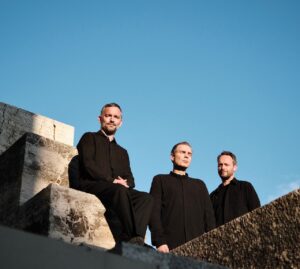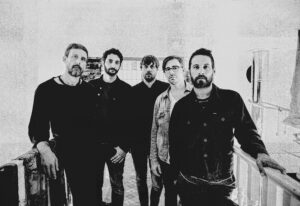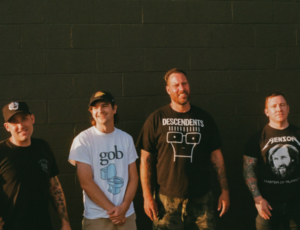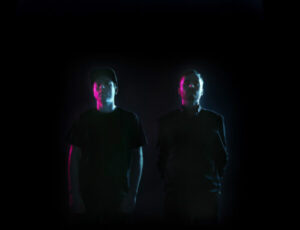
Fans of
Coheed and Cambria have been wondering where the band will take them next since their last album, 2010’s
Year of the Black Rainbow, concluded the five-album saga of The Amory Wars by telling how it all began.
Now with the band’s latest release,
The Afterman: Ascension, the first half of a two-part album that will conclude early next year with
The Afterman: Descension, Coheed and Cambria has taken listeners even further back in time, to long before the events of The Amory Wars, to tell a different kind of story.
Along with the new album, dramatic personal changes within the band have made it seem as if Coheed & Cambria itself has started a new chapter. I had the pleasure of speaking to the band’s long-time lead guitarist Travis Stever about the making of
The Afterman: Ascension, and how moving through hardship has brought about positive change for the group.
Vancouver Weekly: The presence of the story is very clear on Ascension. What’s the relationship between the lyrical content of an album and the music for Coheed?
Travis Stever: There are times, especially with a song like
“Domino the Destitute”, where the fighting is literally in the song. There’s a scene within the song. So obviously that’s a huge part of the concept, and that’s a major part of the song as well. So sometimes those worlds collide. But sometimes the song itself, whether it be from a skeleton [lead singer and story creator] Claudio Sanchez built or something the band arranged together, the song itself is the most important thing first. And then lyrically, he takes it into this other universe and brings that to life.
Vancouver Weekly: Despite the lyrics on the album being ostensibly fictitious, there has always been a sense that Claudio’s lyrics come partly from a personal place.
TS: Real life absolutely dictates a lot of it for Claudio, and especially on this record, the lyrics are much more personal. And that can be for us too because we go through a lot of things together being on tour and being in this band for so many years.
Vancouver Weekly: One of the most special things about Ascension is the return of original Coheed and Cambria drummer Josh Eppard, who was absent for the band’s last two records. What has it been like working with him once again?
TS: Josh coming back is a return to form in some ways and also a brand new thing in other ways. I like to consider Coheed and Cambria as this rolling ball that collects all these different influences as we go. That’s why
Year of the Black Rainbow was different from anything we’d ever done, and albums prior to that were. I think Josh was doing the same thing.
When we weren’t together, he was in other projects playing, and he had to heal and go through quite a shitty time. But at the same time, he got back on his feet and he was very involved in a lot of things musically. So whatever he was doing then and whatever he was part of definitely influenced him to stretch out in other places musically, and he brought that with him. So here we are, we kind of came together after all of us had experienced a few years of learning other things, and it’s like returning to form with a whole new perspective.
And that’s what happened. I mean, he’s the foundation the band was built on. I just feel like the groove Josh brought to this record and all the records that he’s played on is just irreplaceable, and it always will be. Sometimes the drums are just the drums, but with Josh, the drums are another piece. Every groove is just him, that’s what he sweats out. It’s been a real amazing experience to be back; I mean all of us as a collective, once we got into that basement and we worked on the first couple of songs together, it was pretty obvious that we were going to do this.
Vancouver Weekly: Despite reuniting with former drummer Josh Eppard, Coheed ended up parting ways with original bassist Michael Todd, after armed robbery charges were brought against him in 2011. How did that affect the album?
TS: Well in a way, that’s a reason why… well not a reason
why Josh is back, but there was definitely a lot of reassessment of what we were doing and how we were going to pull through, which had happened before, but I mean this time it was pretty heavy. What happened with Mic was a big slap in the face, first off. It was an extreme letdown. Obviously, when you love somebody and care about them too, it hurts. So we went through that whole thing, and we were still working on new music at the time, and we were kind of stepping back and saying ‘how are we gonna do this?’
We had a lot of bass auditions, and at the same time Chris Pennie [drums] had been playing still, but we weren’t getting together as often at that point. It kind of started to become a lull, you know. So we had been working out our relationship with Josh at least on a friendship level for a while before that, just talking and patching things up. So that’s where it kind of happened. We were reassessing everything and we had these bass auditions still after Josh had come back into the fold.
Vancouver Weekly: Through those auditions you ended up discovering Zach Cooper as a replacement for Mic Todd, and he plays on Ascension. What was it about Zach that stood out?
TS: It just turned out that nobody stuck out the way that Zach did. Zach just seemed like somebody that we would hang out with anyway, and how he dealt with the audition, being shy and letting his talent speak, was exactly what stuck out to us. It was more of a personality thing than anything else because the personality allowed the talent to show. Not to say that you shouldn’t be able to strut your shit, I guess that’s part of it, but we just connected with him. And thank god we did because the album’s ten times better. And he’s one of those guys that can bring a lot to the table. He can play a lot of instruments, he’s schooled, but at the same time he’s very good at speaking musically off the cuff, just being able to spontaneously come up with cool things, and that’s the way that we are. We’re not dudes who are graduates from Berklee, you know what I mean? That’s a misconception with the band a lot, that it’s schooled musicians that got together. That’s not the case at all.
Vancouver Weekly: That seems like a fine misconception to have!
TS: Yeah! It’s kind of cool that people go ‘oh you guys are very complicated’. No we’re not! We just love making music and we love experimenting in every way possible to make it the best music and it’s just for us, but people end up liking it. I mean, it’s always just for us. If you create music you’re creating it for yourself first and foremost. But I find that a lot of our fans appreciate when we kind of go a little far out there and experiment. Sometimes they can be turned off but that’s all part of it and Zach is perfect with that kind of deal. And so that’s how it worked out. Sadly enough, the Mic Todd thing brought in somebody incredible. And it’s the worst way for it to happen, but that’s how it went down.
Vancouver Weekly: Coheed has always incorporated lots of different kinds of styles across their albums. Are there different people within the band who bring out these different styles?
TS: Definitely there has been, on albums prior. Most of the time, Claudio has a skeleton of a song, but the rest of the band members will definitely bring an element that could change things up. When it comes to
Ascension, there are definitely a good amount of songs that stuck true to the demos that Claudio had and we went with that vision. But you take a song like
“Evagria the Faithful”, and a lot of the exterior musical instruments turned it into this whole other entity.
Once you have a song, if the core of the song is a really strong one, then it’s hard to hide that. And you wouldn’t want to hide that! The minute that [Claudio] wants to put his voice to a song and arrange it the way that a Coheed song would be, that’s where it happens. So I don’t think that there’s any one person that makes the metal side, or makes the funky side.
Vancouver Weekly: The second half of the album is the The Afterman: Descension. Were the two halves written and recorded together, and is Descension just waiting for release at this point?
TS: Absolutely, yeah, it’s all done. Can’t wait.
Vancouver Weekly: It’s funny, because the song that most people probably heard the most before the release of this album was an acoustic version of “Sentry the Defiant” being played by Claudio in his home. It’s clear now that “Sentry” is going to be a song off of Descension.
TS: Well, we have another song called
“Iron Fist” that we were playing, it’s the same kind of thing too. We were doing something based on
Neverender for [our first album]
Second Stage Turbine Blade, and we would do an acoustic set before, and that’s when Chris and Mic were still in the band. But Claud and I had worked on
“Iron Fist” ages before and we were doing that on that tour, and a lot of people really loved it and even asked us to play it acoustic as of late; but that’s going to be on that record too. And we’re really excited for that version.
And
“Sentry”, it’s a full band kick-ass version. And it’s kind of interesting, cause we’ve been playing
“Sentry” out, and the only version that people know, other than seeing other YouTube versions of us playing it as a band, is Claudio’s version alone, which is incredible. And that’s an example of like, there’s the song right there, but wait until you hear the band version. The home base is there but we all added these things to this vision that Claud originally had for the song, and then each one of us – whether it be Josh’s really heavy fucking beat and really amazing groove that goes into it – I mean I couldn’t have even imagined how it’d turn out when I first heard the acoustic demo. There’s things that I’m just pretty blown away that it comes to the band and this is what it becomes. I can’t wait for people to hear them the way they are.
The Afterman: Ascension is out now. You can find out more at
coheedandcambria.com.
 Fans of Coheed and Cambria have been wondering where the band will take them next since their last album, 2010’s Year of the Black Rainbow, concluded the five-album saga of The Amory Wars by telling how it all began.
Now with the band’s latest release, The Afterman: Ascension, the first half of a two-part album that will conclude early next year with The Afterman: Descension, Coheed and Cambria has taken listeners even further back in time, to long before the events of The Amory Wars, to tell a different kind of story.
Along with the new album, dramatic personal changes within the band have made it seem as if Coheed & Cambria itself has started a new chapter. I had the pleasure of speaking to the band’s long-time lead guitarist Travis Stever about the making of The Afterman: Ascension, and how moving through hardship has brought about positive change for the group.
Vancouver Weekly: The presence of the story is very clear on Ascension. What’s the relationship between the lyrical content of an album and the music for Coheed?
Travis Stever: There are times, especially with a song like “Domino the Destitute”, where the fighting is literally in the song. There’s a scene within the song. So obviously that’s a huge part of the concept, and that’s a major part of the song as well. So sometimes those worlds collide. But sometimes the song itself, whether it be from a skeleton [lead singer and story creator] Claudio Sanchez built or something the band arranged together, the song itself is the most important thing first. And then lyrically, he takes it into this other universe and brings that to life.
Vancouver Weekly: Despite the lyrics on the album being ostensibly fictitious, there has always been a sense that Claudio’s lyrics come partly from a personal place.
TS: Real life absolutely dictates a lot of it for Claudio, and especially on this record, the lyrics are much more personal. And that can be for us too because we go through a lot of things together being on tour and being in this band for so many years.
Vancouver Weekly: One of the most special things about Ascension is the return of original Coheed and Cambria drummer Josh Eppard, who was absent for the band’s last two records. What has it been like working with him once again?
TS: Josh coming back is a return to form in some ways and also a brand new thing in other ways. I like to consider Coheed and Cambria as this rolling ball that collects all these different influences as we go. That’s why Year of the Black Rainbow was different from anything we’d ever done, and albums prior to that were. I think Josh was doing the same thing.
When we weren’t together, he was in other projects playing, and he had to heal and go through quite a shitty time. But at the same time, he got back on his feet and he was very involved in a lot of things musically. So whatever he was doing then and whatever he was part of definitely influenced him to stretch out in other places musically, and he brought that with him. So here we are, we kind of came together after all of us had experienced a few years of learning other things, and it’s like returning to form with a whole new perspective.
And that’s what happened. I mean, he’s the foundation the band was built on. I just feel like the groove Josh brought to this record and all the records that he’s played on is just irreplaceable, and it always will be. Sometimes the drums are just the drums, but with Josh, the drums are another piece. Every groove is just him, that’s what he sweats out. It’s been a real amazing experience to be back; I mean all of us as a collective, once we got into that basement and we worked on the first couple of songs together, it was pretty obvious that we were going to do this.
Vancouver Weekly: Despite reuniting with former drummer Josh Eppard, Coheed ended up parting ways with original bassist Michael Todd, after armed robbery charges were brought against him in 2011. How did that affect the album?
TS: Well in a way, that’s a reason why… well not a reason why Josh is back, but there was definitely a lot of reassessment of what we were doing and how we were going to pull through, which had happened before, but I mean this time it was pretty heavy. What happened with Mic was a big slap in the face, first off. It was an extreme letdown. Obviously, when you love somebody and care about them too, it hurts. So we went through that whole thing, and we were still working on new music at the time, and we were kind of stepping back and saying ‘how are we gonna do this?’
We had a lot of bass auditions, and at the same time Chris Pennie [drums] had been playing still, but we weren’t getting together as often at that point. It kind of started to become a lull, you know. So we had been working out our relationship with Josh at least on a friendship level for a while before that, just talking and patching things up. So that’s where it kind of happened. We were reassessing everything and we had these bass auditions still after Josh had come back into the fold.
Vancouver Weekly: Through those auditions you ended up discovering Zach Cooper as a replacement for Mic Todd, and he plays on Ascension. What was it about Zach that stood out?
TS: It just turned out that nobody stuck out the way that Zach did. Zach just seemed like somebody that we would hang out with anyway, and how he dealt with the audition, being shy and letting his talent speak, was exactly what stuck out to us. It was more of a personality thing than anything else because the personality allowed the talent to show. Not to say that you shouldn’t be able to strut your shit, I guess that’s part of it, but we just connected with him. And thank god we did because the album’s ten times better. And he’s one of those guys that can bring a lot to the table. He can play a lot of instruments, he’s schooled, but at the same time he’s very good at speaking musically off the cuff, just being able to spontaneously come up with cool things, and that’s the way that we are. We’re not dudes who are graduates from Berklee, you know what I mean? That’s a misconception with the band a lot, that it’s schooled musicians that got together. That’s not the case at all.
Vancouver Weekly: That seems like a fine misconception to have!
TS: Yeah! It’s kind of cool that people go ‘oh you guys are very complicated’. No we’re not! We just love making music and we love experimenting in every way possible to make it the best music and it’s just for us, but people end up liking it. I mean, it’s always just for us. If you create music you’re creating it for yourself first and foremost. But I find that a lot of our fans appreciate when we kind of go a little far out there and experiment. Sometimes they can be turned off but that’s all part of it and Zach is perfect with that kind of deal. And so that’s how it worked out. Sadly enough, the Mic Todd thing brought in somebody incredible. And it’s the worst way for it to happen, but that’s how it went down.
Vancouver Weekly: Coheed has always incorporated lots of different kinds of styles across their albums. Are there different people within the band who bring out these different styles?
TS: Definitely there has been, on albums prior. Most of the time, Claudio has a skeleton of a song, but the rest of the band members will definitely bring an element that could change things up. When it comes to Ascension, there are definitely a good amount of songs that stuck true to the demos that Claudio had and we went with that vision. But you take a song like “Evagria the Faithful”, and a lot of the exterior musical instruments turned it into this whole other entity.
Once you have a song, if the core of the song is a really strong one, then it’s hard to hide that. And you wouldn’t want to hide that! The minute that [Claudio] wants to put his voice to a song and arrange it the way that a Coheed song would be, that’s where it happens. So I don’t think that there’s any one person that makes the metal side, or makes the funky side.
Vancouver Weekly: The second half of the album is the The Afterman: Descension. Were the two halves written and recorded together, and is Descension just waiting for release at this point?
TS: Absolutely, yeah, it’s all done. Can’t wait.
Vancouver Weekly: It’s funny, because the song that most people probably heard the most before the release of this album was an acoustic version of “Sentry the Defiant” being played by Claudio in his home. It’s clear now that “Sentry” is going to be a song off of Descension.
TS: Well, we have another song called “Iron Fist” that we were playing, it’s the same kind of thing too. We were doing something based on Neverender for [our first album] Second Stage Turbine Blade, and we would do an acoustic set before, and that’s when Chris and Mic were still in the band. But Claud and I had worked on “Iron Fist” ages before and we were doing that on that tour, and a lot of people really loved it and even asked us to play it acoustic as of late; but that’s going to be on that record too. And we’re really excited for that version.
And “Sentry”, it’s a full band kick-ass version. And it’s kind of interesting, cause we’ve been playing “Sentry” out, and the only version that people know, other than seeing other YouTube versions of us playing it as a band, is Claudio’s version alone, which is incredible. And that’s an example of like, there’s the song right there, but wait until you hear the band version. The home base is there but we all added these things to this vision that Claud originally had for the song, and then each one of us – whether it be Josh’s really heavy fucking beat and really amazing groove that goes into it – I mean I couldn’t have even imagined how it’d turn out when I first heard the acoustic demo. There’s things that I’m just pretty blown away that it comes to the band and this is what it becomes. I can’t wait for people to hear them the way they are.
The Afterman: Ascension is out now. You can find out more at coheedandcambria.com.
Fans of Coheed and Cambria have been wondering where the band will take them next since their last album, 2010’s Year of the Black Rainbow, concluded the five-album saga of The Amory Wars by telling how it all began.
Now with the band’s latest release, The Afterman: Ascension, the first half of a two-part album that will conclude early next year with The Afterman: Descension, Coheed and Cambria has taken listeners even further back in time, to long before the events of The Amory Wars, to tell a different kind of story.
Along with the new album, dramatic personal changes within the band have made it seem as if Coheed & Cambria itself has started a new chapter. I had the pleasure of speaking to the band’s long-time lead guitarist Travis Stever about the making of The Afterman: Ascension, and how moving through hardship has brought about positive change for the group.
Vancouver Weekly: The presence of the story is very clear on Ascension. What’s the relationship between the lyrical content of an album and the music for Coheed?
Travis Stever: There are times, especially with a song like “Domino the Destitute”, where the fighting is literally in the song. There’s a scene within the song. So obviously that’s a huge part of the concept, and that’s a major part of the song as well. So sometimes those worlds collide. But sometimes the song itself, whether it be from a skeleton [lead singer and story creator] Claudio Sanchez built or something the band arranged together, the song itself is the most important thing first. And then lyrically, he takes it into this other universe and brings that to life.
Vancouver Weekly: Despite the lyrics on the album being ostensibly fictitious, there has always been a sense that Claudio’s lyrics come partly from a personal place.
TS: Real life absolutely dictates a lot of it for Claudio, and especially on this record, the lyrics are much more personal. And that can be for us too because we go through a lot of things together being on tour and being in this band for so many years.
Vancouver Weekly: One of the most special things about Ascension is the return of original Coheed and Cambria drummer Josh Eppard, who was absent for the band’s last two records. What has it been like working with him once again?
TS: Josh coming back is a return to form in some ways and also a brand new thing in other ways. I like to consider Coheed and Cambria as this rolling ball that collects all these different influences as we go. That’s why Year of the Black Rainbow was different from anything we’d ever done, and albums prior to that were. I think Josh was doing the same thing.
When we weren’t together, he was in other projects playing, and he had to heal and go through quite a shitty time. But at the same time, he got back on his feet and he was very involved in a lot of things musically. So whatever he was doing then and whatever he was part of definitely influenced him to stretch out in other places musically, and he brought that with him. So here we are, we kind of came together after all of us had experienced a few years of learning other things, and it’s like returning to form with a whole new perspective.
And that’s what happened. I mean, he’s the foundation the band was built on. I just feel like the groove Josh brought to this record and all the records that he’s played on is just irreplaceable, and it always will be. Sometimes the drums are just the drums, but with Josh, the drums are another piece. Every groove is just him, that’s what he sweats out. It’s been a real amazing experience to be back; I mean all of us as a collective, once we got into that basement and we worked on the first couple of songs together, it was pretty obvious that we were going to do this.
Vancouver Weekly: Despite reuniting with former drummer Josh Eppard, Coheed ended up parting ways with original bassist Michael Todd, after armed robbery charges were brought against him in 2011. How did that affect the album?
TS: Well in a way, that’s a reason why… well not a reason why Josh is back, but there was definitely a lot of reassessment of what we were doing and how we were going to pull through, which had happened before, but I mean this time it was pretty heavy. What happened with Mic was a big slap in the face, first off. It was an extreme letdown. Obviously, when you love somebody and care about them too, it hurts. So we went through that whole thing, and we were still working on new music at the time, and we were kind of stepping back and saying ‘how are we gonna do this?’
We had a lot of bass auditions, and at the same time Chris Pennie [drums] had been playing still, but we weren’t getting together as often at that point. It kind of started to become a lull, you know. So we had been working out our relationship with Josh at least on a friendship level for a while before that, just talking and patching things up. So that’s where it kind of happened. We were reassessing everything and we had these bass auditions still after Josh had come back into the fold.
Vancouver Weekly: Through those auditions you ended up discovering Zach Cooper as a replacement for Mic Todd, and he plays on Ascension. What was it about Zach that stood out?
TS: It just turned out that nobody stuck out the way that Zach did. Zach just seemed like somebody that we would hang out with anyway, and how he dealt with the audition, being shy and letting his talent speak, was exactly what stuck out to us. It was more of a personality thing than anything else because the personality allowed the talent to show. Not to say that you shouldn’t be able to strut your shit, I guess that’s part of it, but we just connected with him. And thank god we did because the album’s ten times better. And he’s one of those guys that can bring a lot to the table. He can play a lot of instruments, he’s schooled, but at the same time he’s very good at speaking musically off the cuff, just being able to spontaneously come up with cool things, and that’s the way that we are. We’re not dudes who are graduates from Berklee, you know what I mean? That’s a misconception with the band a lot, that it’s schooled musicians that got together. That’s not the case at all.
Vancouver Weekly: That seems like a fine misconception to have!
TS: Yeah! It’s kind of cool that people go ‘oh you guys are very complicated’. No we’re not! We just love making music and we love experimenting in every way possible to make it the best music and it’s just for us, but people end up liking it. I mean, it’s always just for us. If you create music you’re creating it for yourself first and foremost. But I find that a lot of our fans appreciate when we kind of go a little far out there and experiment. Sometimes they can be turned off but that’s all part of it and Zach is perfect with that kind of deal. And so that’s how it worked out. Sadly enough, the Mic Todd thing brought in somebody incredible. And it’s the worst way for it to happen, but that’s how it went down.
Vancouver Weekly: Coheed has always incorporated lots of different kinds of styles across their albums. Are there different people within the band who bring out these different styles?
TS: Definitely there has been, on albums prior. Most of the time, Claudio has a skeleton of a song, but the rest of the band members will definitely bring an element that could change things up. When it comes to Ascension, there are definitely a good amount of songs that stuck true to the demos that Claudio had and we went with that vision. But you take a song like “Evagria the Faithful”, and a lot of the exterior musical instruments turned it into this whole other entity.
Once you have a song, if the core of the song is a really strong one, then it’s hard to hide that. And you wouldn’t want to hide that! The minute that [Claudio] wants to put his voice to a song and arrange it the way that a Coheed song would be, that’s where it happens. So I don’t think that there’s any one person that makes the metal side, or makes the funky side.
Vancouver Weekly: The second half of the album is the The Afterman: Descension. Were the two halves written and recorded together, and is Descension just waiting for release at this point?
TS: Absolutely, yeah, it’s all done. Can’t wait.
Vancouver Weekly: It’s funny, because the song that most people probably heard the most before the release of this album was an acoustic version of “Sentry the Defiant” being played by Claudio in his home. It’s clear now that “Sentry” is going to be a song off of Descension.
TS: Well, we have another song called “Iron Fist” that we were playing, it’s the same kind of thing too. We were doing something based on Neverender for [our first album] Second Stage Turbine Blade, and we would do an acoustic set before, and that’s when Chris and Mic were still in the band. But Claud and I had worked on “Iron Fist” ages before and we were doing that on that tour, and a lot of people really loved it and even asked us to play it acoustic as of late; but that’s going to be on that record too. And we’re really excited for that version.
And “Sentry”, it’s a full band kick-ass version. And it’s kind of interesting, cause we’ve been playing “Sentry” out, and the only version that people know, other than seeing other YouTube versions of us playing it as a band, is Claudio’s version alone, which is incredible. And that’s an example of like, there’s the song right there, but wait until you hear the band version. The home base is there but we all added these things to this vision that Claud originally had for the song, and then each one of us – whether it be Josh’s really heavy fucking beat and really amazing groove that goes into it – I mean I couldn’t have even imagined how it’d turn out when I first heard the acoustic demo. There’s things that I’m just pretty blown away that it comes to the band and this is what it becomes. I can’t wait for people to hear them the way they are.
The Afterman: Ascension is out now. You can find out more at coheedandcambria.com. 









